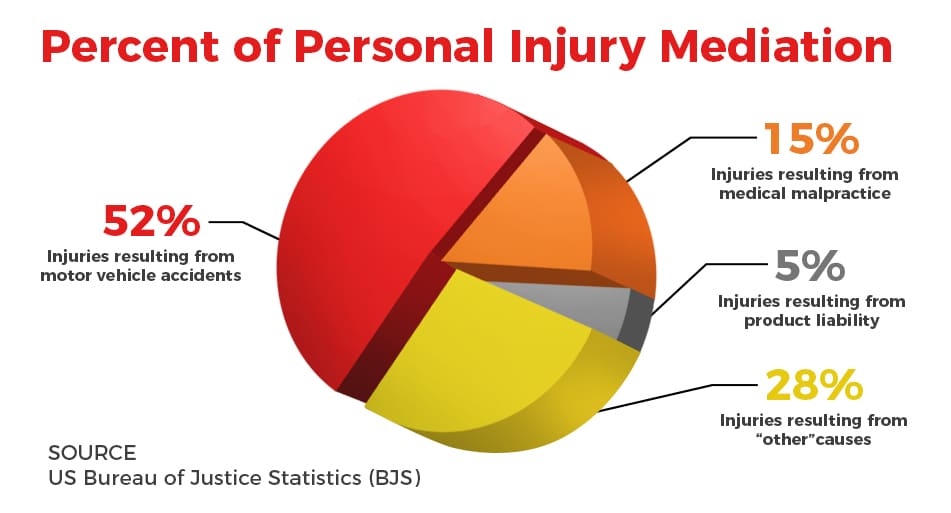1. How many injury cases get settled through mediation?
About 97%
Before getting to know all there is about personal injury mediation, let’s check out these statistics estimated by the Department of justice on personal Injuries:

Exact data for personal injury cases don’t exist, but based on the Department of Justice estimate, about 16,397 injury cases went through trial. The estimated figure of the total injured cases is about 409,925 which mean that Just 4% of personal injury cases went through a trial, and the rest is shared between those who didn’t file a case at all and those who settled through mediation.
- 52% of injuries occurred through a motor vehicle accident
- 15% were injured from medical malpractice
- 5% of injury cases happened from product liability
- 28% of injuries resulted from “other” causes.
Although the number of injuries recorded is massive, very few of these cases eventually go through trial and that is because many of them go through Alternative Dispute Resolution (ADR) which is about 97%and got resolved. Injury cases are one of the issues that usually go through mediation with a very high success rate.
2.What is the meaning of mediation in a personal injury case?
Mediation is an alternative dispute resolution strategy usually managed by a professional called Mediator. Mediation is a less formal gathering where disputes on injury cases and claims are solved. The mediator makes sure the parties involved reach a consensus not forcefully but by structured deliberation.
Every party involved is given equal chance so that the mediation process does not tilt in favor of any party. Equal opportunity is usually given for all parties involved to express their concerns and give their position. This is why a mediator is usually hired to spearhead deliberations like this to help erase partiality and more disputes.
Did you get injured in an accident? We’ll get you the compensation you deserve.
NO FEE until we win! For a free consultation, call 248-591-4090 today!
3. Is it compulsory to go through personal Mediation?
Personal injury mediation usually will depend on your kind of case and location, sometimes even if you don’t want a mediation the judge could still rule order in favor of mediation if he/she believes it can get your case solved. Mediation can save you a lot of time and resources especially if you are willing to reach an agreement with the other party or parties.
4. How does a personal injury mediation meeting run?
- Firstly, every party involved will have to meet each other, preferably a round table meeting. Each party will learn their roles in the mediation process and the mediators will make sure everyone is well acquainted with one another.
- The attorneys will also be present in the process especially the defense attorney. The charged may or may not be around for the mediation. Insurance representatives could also be present and the claim adjuster who oversees the claim proceedings.
- Before starting the meeting at all, it is important that everyone present signs a confidentiality agreement. This agreement is to ensure that all negotiations and discoveries remain within the mediation circle. So, no one will have to worry about being charged or taken advantage of by the other. Mediation is not a trial. It is usually adopted to help avoid a trial.
- The mediation process will usually start with opening statements first from the mediator, then the attorney representing the injured victim. Then it’s followed by the defense lawyer. Mediation that starts like this starts very hotly because of the advantage every party involved wants to gain. Other mediators knowing this usually decide to scrap opening statements altogether to avoid opening rift just so that there can be progress towards reaching a consensus.
- At this point, there will be a joint session with the two parties involved. Afterward, the two will be separated into different rooms as the negotiation continues usually anchored by the mediator. He/she is saddled with the job to present each demand and position intelligently as he moves from one room to the other.
- Once an agreement is reached, settlement is close. They’ll both need to sign a paper agreement documenting all the terms and conditions of the agreement. Then the lawyers involved will finish up with the necessary paper works and file them with the court. The only thing left at this point is a signature from the plaintiff and the case is closed.
5. Preparing for your personal injury mediation
Don’t go to a Personal Injury Mediation if you are not mentally ready for it. There is a lot to expect in meetings like this and you should be well prepared and aware of the possibilities in such a meeting. It will give you an edge if you’re ready.
Keep this in mind, that:
Some of the statements won’t go well with you
The opening statement is where it usually starts from. So, if opening statements are allowed, you’ll hear the attorney of the second party counterattack your attorney’s statement which is very much expected. So, don’t take offense, they are simply doing their jobs.
Only make sure you share your thoughts once it gets to your turn.
The first stage of the mediation will feel totally off
You will only reach a consensus through negotiation so don’t back off when your counterpart is offering a very low return for your injury. Your counterparts are expected to consider your initial offer to be very high and attempt to bring it further down. The idea is to find a middle place for you both to reach a consensus.
Mediation will still take some time to come out well, but not as time demanding as opting in for a trial.
The mediator in charge of your negotiation is neutral
A mediator won’t tilt towards any of the parties; you have your attorney to help you win your case. The mediator simply pushes the conversation of both parties in such a way that an agreement will be reached.
A Compromise must be reached
Once you know this, you’ll be ready to also let go to help maximize the possibility of reaching an agreement. Reaching any kind of consensus is always a give-and-take situation.
6. Will personal injury mediation work?
Early estimation shows that only 4% of personal injuries get to be tried. Most cases like this are usually better settled outside of the court to get a better outcome. Mediation is preferable by 96% of personal injury cases, and that’s a lot of figures there.
With the advantage of having a neutral party to help guide the negotiation, you are sure to be directly involved in the negotiation and also compromise.
Conclusion
Some of the advantages that personal injury mediation offers are:
- Saves Time
- Closed-door negotiations
- Cost-effective
- Ease in scheduling
- More Personal
- Very flexible
- No underdog, both parties are in charge
Mediation sometimes can be mandatory as stated earlier because of the judges’ verdict. But it still doesn’t rule out the fact that when negotiation fails, mediation can easily suffice. And it is never done under duress.
Mediation had worked in time past and still does; the success rate is high so give it a try. To find a good mediator with the record, you can always check the official directory for more info.

